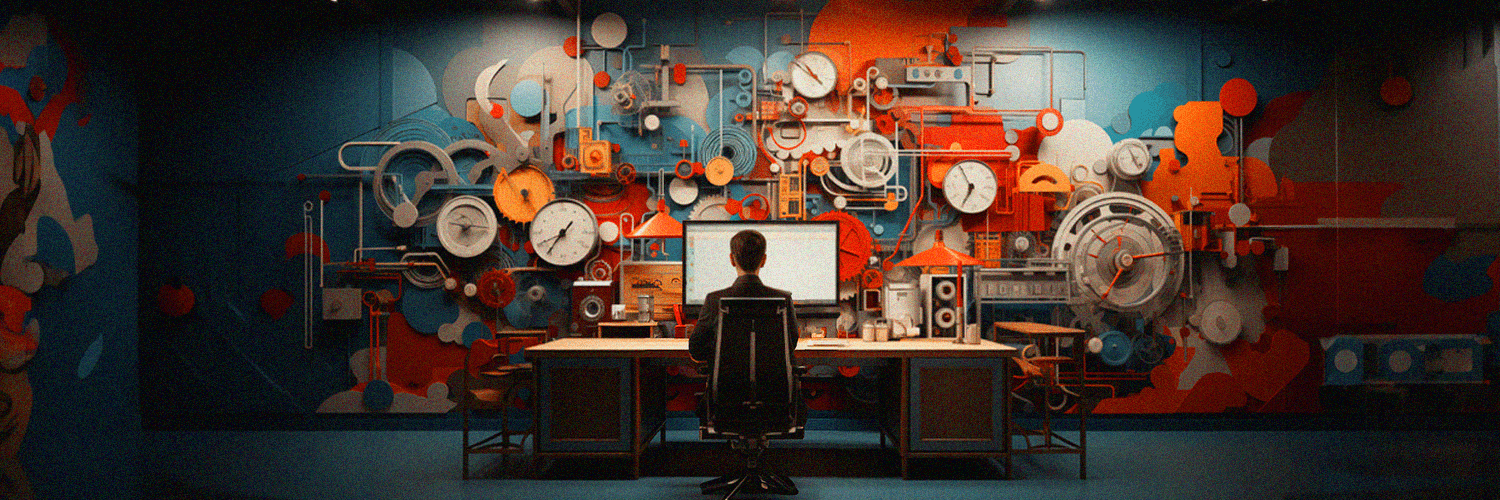Picture this: You're rushing to book a meeting room for an important client presentation, only to find out that all the rooms are already taken. Does this sound familiar? If you've ever worked in an office, you've likely experienced the frustration of meeting room chaos.
But a meeting room booking system can make this a thing of the past. This essential tool for contemporary offices ensures smooth room reservations and boosts efficiency. So, let’s explore how this technology is reshaping our work habits and highlight the top 10 benefits of a meeting room booking system that will make you wonder how you ever managed without it.
TL;DR:
- Meeting room booking system is essential for organizations with multiple rooms and attendees, streamlining space management and giving admin control over room availability and setup.
- Meeting room chaos is a common issue in offices, leading to frustration and inefficiency.
- Digital meeting room booking systems transform room reservations, and makes scheduling easier, streamlining the office space management process.
- Real-time visibility prevents double bookings and scheduling conflicts.
- Advanced features optimize space utilization and improve overall office efficiency.
- User-friendly interfaces simplify the meeting or conference booking and management process for employees.
- Meeting room booking systems significantly reduce administrative overhead and enhance productivity.
- They offer substantial cost savings and support hybrid work models.
- Room booking systems support sustainability goals and ensure data security.
- The meeting room booking tablet can display real-time availability, allow on-the-spot bookings, and automatically release unused reservations, preventing interruptions and ghost bookings.
What is a Meeting Room Booking System?
A meeting room booking system is a digital tool designed to streamline the process of reserving and managing meeting spaces within an organization. It's a smart, centralized platform that allows employees to view, book, and manage meeting rooms with just a few clicks. Think of it as your office's very own concierge for meeting spaces.
These systems typically come in software or cloud-based applications, accessible via computers, smartphones, or tablets. They're a far cry from the old-school methods of scribbling reservations on a whiteboard or playing email tag with the office manager.
At its core, a meeting room booking software offers real-time visibility of available spaces, enabling users to find and reserve the perfect room for their needs quickly. But it's not just about booking – these systems often come packed with features like calendar integration, automated notifications, and even analytics to help optimize space utilization.
The beauty of a meeting room booking system lies in its ability to eliminate the common pain points associated with manual conference room reservation processes: double bookings, confusion about room availability, and time wasted trying to coordinate meeting spaces.
Whether you're a small startup or a large corporation, booking software can be tailored to fit your specific needs. They're designed to accommodate everyone in the office – from the CEO planning a board meeting to the intern organizing a team brainstorming session.
Who Needs Meeting Room Booking and Scheduling Software?
Meeting room booking and scheduling software are essential for any organization that regularly holds meetings, mainly when there are multiple rooms, varying schedules, and numerous attendees. Scheduling software streamlines the management process for companies of all sizes, from small startups to large enterprises.
With the right scheduling software, businesses can ensure that rooms are available when needed, avoiding conflicts and optimizing usage. A room booking app provides an easy-to-use interface that empowers employees to quickly find and reserve a room that fits their needs. The software can sync with existing calendars, making it simple for attendees to check availability and select a suitable time slot, giving them a sense of control over their schedules.
For administrators, the scheduling software is a game-changer, simplifying the management process. It offers a room finder feature that shows which rooms are available and their setup, and helps the admin coordinate optimal room setup requirements, ensuring that the space is ready for the meeting. By using such tools, businesses can significantly enhance their operational efficiency and ensure smooth meetings and events.
Applicability in Various Industries and Venues
- Corporate Offices: A room booking app streamlines the scheduling of conference rooms, ensuring that key meetings happen without delays.
- Educational Institutions: Manages classroom and lecture hall bookings, especially when multiple departments share spaces.
- Healthcare Facilities: Helps in booking consultation rooms, ensuring smooth patient flow and doctor availability.
- Hotels and Event Venues: Room scheduling software in reserving event spaces for conferences, weddings, or other gatherings, making the booking process seamless for attendees.
- Co-working Spaces: Room management software facilitates the reservation of shared meeting rooms among different organizations using the same space.
- Government Buildings: Manages the booking of public meeting rooms, ensuring availability for various governmental functions.

Manual Meeting Room Reservation Is Inefficient and Costly
In today's fast-paced business environment, efficiency is key. Yet, many organizations still cling to outdated manual methods for reserving meeting and conference rooms, unaware of the hidden costs and inefficiencies lurking beneath the surface. The absence of a proper room reservation system or a booking app can lead to a cascade of problems that significantly impact productivity and the bottom line.
Consider this startling statistic: 43% of business leaders claim poor communication decreases productivity. Manual meeting room reservations are a prime example of this communication breakdown. Without a centralized room booking software, meeting attendees waste precious time searching for available spaces, or worse, showing up to find their reserved conference room already occupied.
The financial impact of these inefficiencies is staggering. The cost of ineffective communication in the workplace amounts to $2 trillion annually in the US alone. While this figure encompasses various communication issues, a significant portion can be attributed to the chaos surrounding meeting room management.
Traditional methods like using spreadsheets, whiteboards, or relying on a single person to manage bookings are time-consuming and prone to human error. These manual processes often lead to the following:
- Confusion and conflicts over room availability
- Wasted time searching for suitable meeting spaces
- Underutilization of available rooms
- Frustration among employees, clients, and other meeting attendees
- Decreased productivity due to scheduling issues, meeting delays, or cancellations
While some might argue that free room reservation software or a booking app could solve these issues, many such solutions lack the robust features needed for efficient space management in a bustling office environment. A comprehensive online room reservation software offers more than basic booking capabilities.
A proper room booking software system can transform how your organization manages its meeting spaces and resource scheduling. It eliminates the guesswork, reduces conflicts, and provides a clear, real-time view of room availability. This not only saves time but also enhances your organization's overall employee experience and professionalism.
How Meeting Room Booking Systems Work
Modern meeting room booking systems are designed to simplify and streamline reserving and managing conference rooms and other meeting spaces. These sophisticated tools combine user-friendly interfaces with powerful backend functionality to create a seamless experience for employees and administrators. Let's dive into how these systems typically operate.
A centralized room booking calendar is at the heart of any meeting room booking system. It provides a real-time overview of meeting schedules and room availability, allowing users to quickly identify free slots and make bookings without the risk of conflicts.
The user interface often comes in the form of room booking apps, which can be accessed via smartphones, tablets, or desktop computers. These apps allow employees to:
- View available rooms and their amenities
- Book a room for a specific time slot
- Extend or shorten existing bookings
- Cancel reservations when plans change
One of the most innovative features of modern systems is the meeting room booking display. These are typically small tablets or screens mounted outside each meeting room. They show the room's current status (occupied or available) and upcoming reservations, often allowing for on-the-spot conference room booking. This visual cue helps prevent interruptions and confusion, especially in busy office environments.

The room booking tablet isn't just for show - it's an interactive tool. Many systems allow users to check in for their reservation directly from an easy to use display, automatically releasing the room if no one shows up within a set time frame. This feature helps combat the common problem of "ghost bookings," where reserved rooms sit empty.
Behind the scenes, the meeting room booker system constantly updates and synchronizes information across all devices and platforms. When someone books a room through the mobile app, it instantly reflects on the room booking calendar, the room booking display, and any other integrated systems like Outlook or Google Calendar.
Many conference room booking solutions also incorporate smart features such as:
- Automatic suggestions for alternative rooms if the desired space is unavailable
- Integration with digital signage throughout the office to guide people to their booked rooms
- Analytics tools to track room usage and help optimize office space utilization
By leveraging these technologies, meeting room booking software transform a chaotic and time-consuming process into a smooth, efficient operation. They eliminate the friction points associated with manual booking methods and inefficient admin procedures, freeing up time and mental energy for what matters - the meetings themselves.
10 Benefits of Implementing a Meeting Room Booking System
Implementing a meeting room scheduler software can revolutionize how your organization manages its meeting spaces. Here are ten essential benefits that highlight why investing in such a system is a smart move for businesses of all sizes.
1. Accessibility and Convenience
Meeting room scheduling software provides unparalleled accessibility and convenience. Employees can check meeting room availability and book spaces from anywhere, anytime, using their smartphones or computers. This 24/7 access eliminates the need to be physically present in the office to reserve a room, supporting flexible work arrangements and improving overall efficiency.
2. Reduced Administration Overhead
One of the most significant advantages of conference room scheduling software is the dramatic reduction in admin overhead. Gone are the days of manual booking and scheduling processes that consume valuable time and resources. The system automates scheduling tasks, allowing administrative staff to focus on more strategic activities that add value to the organization. For instance, by enabling employees to book workspaces with Yarooms room booking software, Jigsaw Insurance saves the equivalent of one team leader's full-time hours, worth £21,000 to £23,000 per year!
3. Prevention of Double Bookings
Double bookings can cost $1,800 in excess email communication and between $2,100 and $4,100 in poor communication per employee annually. A meeting room booking software eliminates this problem by providing real-time updates on meeting room availability. Once a room is booked, it's instantly reflected across the entire system (for example, in a shared calendar), preventing any possibility of overlapping reservations and ensuring smooth operations.
4. Increased Efficiency and Time Savings
Almost half (48%) of office workers report wasting significant time each week looking for free meeting rooms, with some losing an average of half an hour per day. With a streamlined booking and scheduling process, employees spend less time searching for available spaces or resolving scheduling conflicts. This increased efficiency translates to significant time savings across the organization. The quick and easy room reservation process means more time can be devoted to productive work and meaningful interactions.
5. Support for Hybrid Work Models
In today's evolving work landscape, hybrid models are becoming increasingly common. Meeting room booking software supports this trend by allowing remote workers to easily book spaces for the days they're in the office. It also facilitates the coordination of in-person and virtual attendees, ensuring everyone has the optimal resources they need for effective collaboration.
6. Better Workplace Visibility and Collaboration
A centralized meeting room scheduling system provides better visibility into workplace dynamics. Employees can easily see who's meeting where and when, fostering improved collaboration and communication. This transparency can lead to more spontaneous interactions and knowledge sharing across teams. Additionally, by showing the capacity of each room, the system ensures that teams select the most appropriately sized space for their meetings, preventing overcrowding or underutilization of larger rooms.
7. Enhanced Employee Experience
Many employees feel frustration from occupied rooms and encountering booked but empty rooms, further deteriorating their experience. By streamlining the process of finding and booking meeting spaces, booking software greatly enhance the employee experience. The frustration of hunting for an available conference room is eliminated, leading to higher job satisfaction and a more positive work environment.

8. Cost Savings
While the initial investment in meeting room scheduling software might seem significant, the long-term cost savings are substantial. Organizations can save on operational costs and improve resource allocation by optimizing room usage, reducing administrative tasks, and preventing booking errors. For instance, automated resource scheduling can eliminate the need for a full-time staff member to manage bookings, freeing up their time for more critical tasks. Additionally, better room utilization means organizations can avoid unnecessary expenses such as renting external meeting venues.
9. Optimized Space Utilization
Organizations can make data-driven decisions about their space requirements with detailed analytics on room usage patterns. This insight allows for better space planning, potentially reducing real estate costs by identifying underutilized areas or the need for additional meeting spaces. For example, recognizing consistently underused rooms can lead to repurposing or downsizing to lower rental costs. It is essential considering that meeting room usage is estimated to be only 38% in an average office. Conversely, understanding peak usage times can justify the expansion of meeting areas to accommodate demand, ensuring that all teams have the necessary space to operate efficiently. Moreover, data-driven strategies can enhance employee satisfaction by providing adequate and well-planned meeting environments.
10. More Sustainable Meeting Rooms
51% of employees want their companies to invest in sustainability efforts like carbon reduction and renewable energy. A meeting room booking system can support these goals by optimizing room usage and integrating smart building systems to reduce energy consumption. For example, unbooked rooms can automatically adjust their lights and climate control, creating a more environmentally friendly office. This approach lowers the carbon footprint and results in significant cost savings on utility bills.
Implementing a comprehensive meeting room booking system offers a wide array of benefits that extend far beyond simple scheduling. From improving accessibility and efficiency to supporting modern work models and sustainability efforts, these systems are becoming an essential tool for forward-thinking organizations.
Key Features to Look for in Meeting Room Booking Systems
When selecting a meeting room booking system for your organization, choosing one that offers a comprehensive set of features to meet your specific needs is crucial. Here are some key features to consider:
Ease of Use and Accessibility
The primary goal of any room management software is to simplify the booking process. Look for systems with intuitive interfaces that require minimal training. Solutions like Yarooms, for example, offer user-friendly platforms that make it easy for employees to find and book spaces quickly. The system should be accessible from various devices, ensuring users can make reservations at their desks or on the go.
Calendar Integration and Scheduling Flexibility
A robust room scheduling software should seamlessly integrate with popular calendar applications such as Google Calendar, Microsoft Outlook, or Apple Calendar. This integration allows users to book rooms directly from their preferred calendar app, reducing the need to switch between multiple platforms. Additionally, look for systems that offer flexible scheduling options, such as recurring bookings, multi-room reservations, and the ability to modify or cancel reservations easily.
Mobile Compatibility and Remote Access
In today's mobile-first world, having a system with strong mobile compatibility is essential. Look for room booking apps that offer full functionality on smartphones and tablets, allowing users to manage reservations from anywhere. This feature is particularly crucial for organizations with remote or hybrid work models, ensuring all employees have access to meeting room resources equally.
Real-Time Availability Updates
One of the most critical features of any conference room management system is the ability to provide real-time updates on room availability. This functionality prevents double bookings and allows users to quickly find alternative spaces if their preferred room is occupied. The system should update across all platforms instantaneously to maintain accuracy and prevent conflicts.
Automated Notifications and Reminders
To improve efficiency and reduce no-shows, look for a system that sends automated notifications and reminders. These include confirmation emails when a booking is made, reminders before the meeting starts, and notifications if a reservation is changed or canceled. Some advanced systems even send alerts if a booked room isn't checked into within a specific timeframe, allowing the space to be released for others to use.
Integration with Room Digital Signage
Digital signage outside meeting rooms can greatly enhance the user experience. Look for a booking app that integrates with digital displays, showing current and upcoming reservations, room availaibility, and allowing for on-the-spot bookings. This feature improves visibility and helps prevent interruptions to ongoing meetings, and avoid ghost bookings.

Room Usage Analytics and Reporting
A comprehensive room management software should offer detailed analytics and reporting features. These tools provide valuable insights into how your meeting spaces are used, helping you identify patterns, optimize space allocation, and make data-driven decisions about your office layout and resources. Here's how it works in Yarooms, a modern room booking system with powerful workplace analytics:
Security Considerations
Security is paramount with any digital system. Ensure that the room scheduling software you choose has robust security measures in place. These include user authentication, data encryption, and compliance with relevant data protection regulations. The ability to set different access levels for various user groups is also beneficial for controlling who can book certain rooms and for what time slots, or make reservation changes.
What About AI Meeting Room Booking Systems?
AI has revolutionized how we manage meeting room bookings by automating and streamlining the process. In a busy workplace, coordinating meeting schedules, finding available rooms, and ensuring they meet specific requirements can be time-consuming and prone to errors. AI-driven solutions simplify these tasks, improving efficiency and reducing the chances of double bookings or scheduling conflicts.
Take Yarvis, the Yarooms AI workplace scheduling assistant, currently accessible via Microsoft Teams, for an example. Yarvis is your intelligent workplace assistant that makes scheduling and complex meeting room reservation tasks simple. Whether you need to book multiple rooms, schedule recurring meetings, find spaces with specific resources, or locate colleagues within the office space, Yarvis handles it all quickly and seamlessly. With Yarvis AI scheduling assistant, managing your workplace reservations becomes a hassle-free experience.
Optimize Your Meeting Room Management With Smart Solutions
Implementing a smart conference room booking app can transform your workplace dynamics. By choosing a solution incorporating these key features, you'll be well on your way to optimizing your meeting room scheduling. Remember, the goal is to streamline the booking process and create a more efficient, collaborative, and productive work environment.
Yarooms offers a comprehensive meeting and conference room booking and scheduling software that can significantly enhance your workplace's efficiency:
- Yarooms meeting room booking system provides real-time updates on room availability and meeting times, preventing double bookings and ensuring that meeting spaces are utilized efficiently.
- Seamlessly integrates with popular calendar systems like Microsoft Outlook and Google Calendar, allowing users to book rooms directly from their preferred platforms.
- Yarooms scheduling software offers detailed reports on room usage, booking patterns, and occupancy rates, helping you make data-driven decisions to optimize space utilization.
- An intuitive and easy-to-use interface simplifies the booking process for all employees, regardless of their technical proficiency.
- Flexible to adapt to the specific needs of your organization and scalable to grow with your business.
- It allows you to manage additional workplace resources such as projectors, whiteboards, and catering services, ensuring that the room setup fulfills all meeting requirements.
- Offers a mobile booking app that allows users to reserve rooms, check availability, and manage meeting schedules on the go.
- Ensures data security and compliance with industry standards, safeguarding your organization's sensitive information.
Consider how each system aligns with your workplace's specific needs and workflows when evaluating different options. Whether you opt for a comprehensive solution like Yarooms or another room scheduling software, ensure it can grow and adapt to your organization. The right system will solve current challenges and support your future workplace strategies.






.png)







